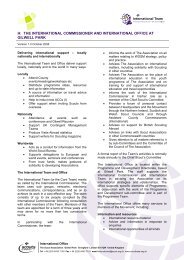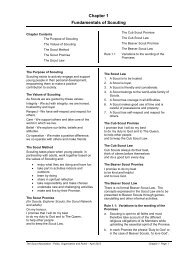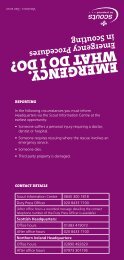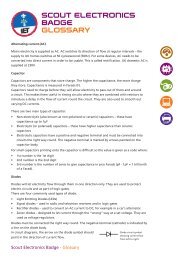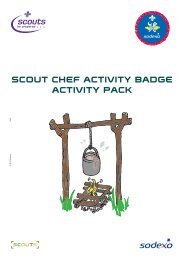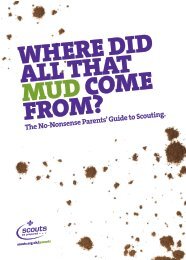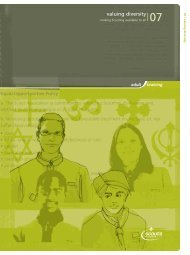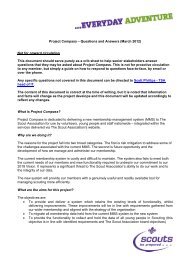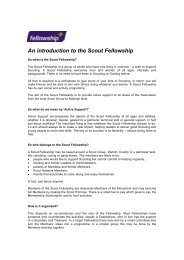Chapter 1: Fundamentals - Net
Chapter 1: Fundamentals - Net
Chapter 1: Fundamentals - Net
You also want an ePaper? Increase the reach of your titles
YUMPU automatically turns print PDFs into web optimized ePapers that Google loves.
c. An Explorer Scout Unit and a Scout Groupwishing to work together should enter into aPartnership Agreement.d. The purpose of the Partnership Agreementis to help an Explorer Scout Unit and ScoutGroup to understand the operationalrelationship between the two.e. Whilst many links will be informal, it isimportant to have a formal PartnershipAgreement to ensure that links aremaintained and obvious to both parties.f. The District Explorer Scout Commissionershould ensure that:the Partnership Agreement sets outclearly the links between the Unit andthe Group and arrangements on liaison,the use of equipment, facilities andresources.the Agreement is reviewed regularly toensure its continuing appropriateness inchanging circumstances.g. Partnership Agreements are not intended tobe legally binding documents. EachAgreement should include the followingsentence: ‘This document is not intended tocreate legal relations’.h. The Agreement should be signed by theDistrict Explorer Scout Commissioner, theExplorer Scout Leader and the Group ScoutLeader.Further information and examples of PartnershipAgreements can be obtained from the ScoutInformation Centre.Rule 3.17 The Formation and Registration ofScout Groupsa. Application for the registration of a ScoutGroup must be made to the DistrictCommissioner by:the prospective Group Scout Leader, inthe case of an Open Scout Group;the organisation which proposes to actas sponsor, in the case of a SponsoredScout Group;the prospective Section Leader in thecase of a Group which will consist of asingle Section.b. The District Commissioner and the DistrictExecutive Committee must be satisfied that:registration is desirable;the proposed Group will be run properly;suitable Leaders can be found;the prospective Group Scout Leader (orSection Leader in the case of a Groupconsisting of a single Section):- accepts the Association's policies,rules and procedures;- undertakes to form a Group ScoutCouncil and a Group ExecutiveCommittee as soon as possible butin any case not later than threemonths after the date of registration;- will give due emphasis to the keypolicies of the Association (see<strong>Chapter</strong> 2);- will initiate a programme of trainingin accordance with the trainingpolicy of the Association;- will comply, as appropriate, with theprovisions of all rules and guidancerelating to Sponsored Scout Groups.c. If the District Commissioner and the DistrictExecutive Committee refuse to recommendthe registration of a Group, the DistrictCommissioner must send a full report on thematter to the appropriate CountryHeadquarters, through the CountyCommissioner.d. If registration is recommended,Headquarters will issue a Certificate ofRegistration and send this via the DistrictSecretary to the prospective Group ScoutLeader (or Section Leader in the case of aGroup consisting of a single Section).e. Notification of registration will be sent byHeadquarters to the County Secretary andCountry Headquarters if appropriate.f. Groups in which the Scout Troop is a Sea orAir Scout Troop may adopt the title SeaScout Group or Air Scout Group asappropriate.Rule 3.18 Annual Renewal of Registrationa. Registration is valid only until the 31 Marchof the calendar year following the issue ofthe Certificate of Registration.b. Registration must be renewed annually bycompleting and submitting an annualregistration and census return as directed byHeadquarters.c. Registration renewal also requires thepayment of the Headquarters MembershipSubscription and any District, and CountyMembership Subscriptions payable.The Scout Association - Policy, Organisation and Rules – January 2012 <strong>Chapter</strong> 3 Page 8
Rule 3.19 Changes in Registrationa. If it is required to change the registration ofa Group or to amalgamate with anotherGroup, Form C2 must be submitted toHeadquarters by the District Secretary.b. Changes in the composition of a Groupmade by the addition or loss of Sections donot necessitate a change of registration.c. Such changes are made with the approvalof the District Commissioner afterconsultation with the District ExecutiveCommittee and the Sponsoring Authority, ifappropriate.Rule 3.20 Suspension of Registrationa. Suspension of registration is a purelytemporary measure.b. A Group may have its registrationsuspended by the District Commissioner, orthe District Executive Committee. Thesuspension must be approved by the CountyCommissioner or County Executive.c. In exceptional circumstances Headquartersmay suspend the registration of a Group.This must be done in consultation with theCounty Commissioner.d. Suspension of registration may also be aconsequence of the suspension of theDistrict.e. In such a case the County Commissionermay direct that Groups will not besuspended but attached to a neighbouringDistrict or to the County as appropriate. SVf. In the event of suspension all Groupactivities must cease and all Group Scoutersare automatically suspended as if each wereindividually suspended.g. During suspension no member of the Groupmay wear uniform or badges.h. If the Group Executive Committee isincluded in the suspension, this must bespecified and the District ExecutiveCommittee will be responsible for theadministration of Group property andfinance during the period of suspension.i. The Group Scout Council will be included inthe suspension only if there are specialreasons and then only with the approval ofthe County Commissioner.j. A District Commissioner or District ExecutiveCommittee who suspends a Group mustreport the matter with full details to theCounty Commissioner. They must alsonotify the County Secretary, the SponsoringAuthority and the appropriate CountryHeadquarters.k. The County Secretary must report thecircumstances as soon as possible to theCounty Executive Committee.l. The District Commissioner should consulttheir Country Headquarters as to how bestto resolve the underlying problem which ledto the suspension.Rule 3.21 Cancellation of Registration andthe Closure of Sections within a Groupa. The registration of a Scout Group may becancelled by Headquarters:on the recommendation of the DistrictCommissioner and the District ExecutiveCommittee, following a meetingspecially convened;At such a meeting, the Scoutersconcerned, the Group Chairman and theSponsoring Authority, if any, are entitledto be heard;if registration is not renewed at the timeof the required annual renewal ofregistration;if the registration of the District iscancelled.b. When the registration of a Scout Group iscancelled the Scout Group ceases to existand action must be taken as described in<strong>Chapter</strong> 13 to deal with its property andassets.c. Any Section within a Group may be closedby the District Commissioner and the DistrictExecutive Committee acting together,following consultation with the SponsoringAuthority, if any.d. The membership of each Member of theclosed Section will cease automatically,unless membership of another Section orGroup is arranged as directed by the DistrictCommissioner.e. A Scout Group cannot exist unless it has acurrent registration with Headquarters.f. Charity law does not permit a Scout Groupto transfer from The Scout Association toany other body whether calling itself a Scoutorganisation or by any other name.g. Individual or several Members of a Groupmay leave and join any other organisationthey wish. The Group itself and all its assetsremain part of The Scout Association whoseparent body is incorporated by RoyalCharter.h. In the event of all the Members leaving, theDistrict will close the Group and cancel itsregistration.The Scout Association - Policy, Organisation and Rules – January 2012 <strong>Chapter</strong> 3 Page 9
i. In the event that not all the Members leave,it will be a decision for the DistrictCommissioner and District ExecutiveCommittee as to whether to close the Groupor try to keep it running with a reducedmembership.Rule 3.22 Management of the Scout Groupa. Every Scout Group is an autonomousorganisation holding its property andequipment and admitting young people tomembership of the Scout Group subject tothe policy and rules of The ScoutAssociation.b. A Scout Group is led by a Group ScoutLeader and managed by a Group ExecutiveCommittee. They are accountable to theGroup Scout Council for the satisfactoryrunning of the Group.c. The Group Scout Leader is assisted andsupported by the Group Scouters in thedelivery of the Balanced Programme foryoung people within the Group.Rule 3.23 The Constitution of the ScoutGroupIn the absence of an existing formally adoptedConstitution to the contrary, the followingrepresents an ideal Constitution and will applywhere the circumstances and the support allow.a. The Group Scout CouncilThe Group Scout Council is the electoral body,which supports Scouting in the Scout Group. It isthe body to which the Group ExecutiveCommittee is accountable.i. Membership of the Group Scout Council isopen to:Scouters;Group Scout Active Support members(including the Group Scout ActiveSupport Manager and Group ScoutActive Support Co-ordinators – ifappointed); Colony, Pack and Troop Assistants ;Skills Instructors;Administrators;Advisers;Patrol Leaders;all parents of Beaver Scouts, CubScouts and Scouts;the Sponsoring Authority or its nominee;any other supporters including formerScouts and their parents who may beadmitted by the Group Scout Leader,the Group Executive Committee or theGroup Scout Council;ii.Explorer Scout Leaders (if stated in aPartnership Agreement);The District Commissioner and DistrictChairman are ex-officio members of theGroup Scout Council.iii. Membership of the Group Scout Councilceases upon:the resignation of the member;the dissolution of the Council;the termination of membership byHeadquarters following arecommendation by the GroupExecutive Committee.iv. The Group Scout Council must hold anAnnual General Meeting within six months ofthe financial year end to:receive and consider the Annual Reportof the Group Executive Committee,including the annual statement ofaccounts;approve the Group Scout Leader'snomination of the Group Chairman andnominated members of the GroupExecutive Committee;elect a Group Secretary and GroupTreasurer;elect certain members of the GroupExecutive Committee;appoint an auditor or independentexaminer or scrutineer as required.b. The Group Executive Committeei. The Group Executive Committee exists tosupport the Group Scout Leader in meetingthe responsibilities of their appointment.The Committee is responsible for:ii.the maintenance of the Group’s propertyand equipment;the raising of funds and theadministration of the Group’s finance;the insurance of persons, property andequipment;Group public occasions;assisting with the recruitment of Leadersand other adult support.The Group Executive Committee consists of:Ex-officio MembersThe Group Chairman;The Group Secretary;The Group Treasurer;The Group Scout Leader;The Assistant Group Scout Leader;The Scout Association - Policy, Organisation and Rules – January 2012 <strong>Chapter</strong> 3 Page 10
The Explorer Scout Leader (if stated in aPartnership Agreement and subject tothat Explorer Scout Leader expresslyindicating to the AGM (in writing or orallyat the meeting) that they are willing toperform such a function);The Sponsoring Authority or itsnominee;All Section Leaders (i.e. individualsholding a Beaver Scout Leader, CubScout Leader or Scout Leader role)subject to that Section Leader expresslyindicating to the AGM (in writing ororally at the meeting) that they arewilling to perform such a function.Nominated Memberspersons nominated by the Group ScoutLeader;the nominations must be approved atthe Group Annual General Meeting;the number of nominated membersmust not exceed the number of electedmembers.Elected Memberspersons elected at the Group AnnualGeneral Meeting;these should normally be four to six innumber;the actual number must be the subjectof a resolution by the Group ScoutCouncil.Co-opted Memberspersons co-opted annually by the GroupExecutive Committee the number of co-opted members mustnot exceed the number of electedmembers.Right of Attendancethe District Commissioner and theDistrict Chairman have the right ofattendance at meetings of the GroupExecutive Committee.iii. Ideally, between the nominated members,elected members and co-opted members,the Group Executive should include a parentof at least one Member of each of theSections in the Group.iv. The Group Executive Committee mayestablish any sub-Committees that it deemsnecessary.v. The Group Scout Leader and the GroupChairman will be ex-officio members of anysub-Committee of the Group ExecutiveCommittee.vi. Any fundraising committee must include atleast two members of the Group ExecutiveCommittee, in addition to the ex-officiomembers. No Section Leader or AssistantLeader may serve on such a fundraisingsub-Committee.vii. A Scout Group is an educational charity.Members of the Group Executive Committeeare the charity trustees of the ScoutGroup. SVviii. Only persons aged 18 and over may be fullvoting members of the Group ExecutiveCommittee because of their status as charitytrustees.ix. Certain people are disqualified from beingcharity trustees by virtue of the CharitiesActs. SVx. Charity trustees are responsible forcomplying with all the legislation applicableto charities.xi. Some Groups may also need to register asa charity. Scout Groups registered as acharity in England and Wales will berequired to make an annual return to theCharity Commission. See Rule 13.3. SVc. The Group Scouters' Meetingi. Membership of the Group Scouters' Meetingconsists of the Group Scout Leader aschairman, all Section Leaders and AssistantLeaders and the Group Scout ActiveSupport Manager. Explorer Scout Leadersmay be included if stated in the partnershipagreement.ii.The role of the Group Scouters' Meeting isto:consider the well-being anddevelopment of each Member of theGroup;ensure the progress of each Memberthrough the programme;plan and co-ordinate all the Group'sactivities;to keep the Group Executive Committeeadvised of the financial and otherresource requirements of the trainingprogramme.d. Conduct of Meetingsi. Only members as defined above may vote inmeetings of the Group Scout Council andthe Group Executive Committee.The Scout Association - Policy, Organisation and Rules – January 2012 <strong>Chapter</strong> 3 Page 11
ii.Decisions are made by a majority of votescast by those present at the meeting. In theevent of an equal number of votes beingcast on either side the chairman does nothave a casting vote and the matter is takennot to have been carried.iii. The Group Scout Council must make aresolution defining a quorum for meetings ofthe Group Scout Council and the GroupExecutive Committee and its sub-Committees.Rule 3.24 Administrators and Advisersa. The Group Chairman and the Group ScoutLeader must be able to work in partnership.b. To assist the formation of this partnershipthe Group Chairman is nominated by theGroup Scout Leader. The appointmentshould not be held by a Leader, Manager orSupporter.c. The appointment of the Group Chairman isapproved by the Group Scout Council at itsAnnual General Meeting.d. Every effort should be made to find a GroupChairman. Only in extreme circumstancesmay the Group Scout Leader act as GroupChairman for a short period.e. The Group Secretary and Group Treasurerare elected by the Group Scout Council atthe Annual General Meeting every year.Neither appointment may be held by aScouter.f. No individual should hold more than one ofthe appointments of Group Chairman,Secretary or Treasurer.g. Other Administrators and Advisers may beappointed by the Group ExecutiveCommittee with the approval of the GroupScout Leader as per POR: The AppointmentProcess.h. Administrators and Advisers appointmentsmay be terminated by:the resignation of the holder;the unanimous resolution of all othermembers of the Group ExecutiveCommittee;the expiry of the period of theappointment;confirmation by Headquarters of thetermination of the appointment in theevent of the cancellation of theregistration of the Group.i. The appointment and termination of allGroup Administrators and Advisersappointments must be reported to theDistrict Secretary who should maintain arecord of such appointments.Rule 3.25 Minimum Age for Appointmentsa. To hold a adult appointment in a ScoutGroup a person must have reached the ageof 18.Rule 3.26 The Appointment of Adultsa. No person aged 18 or over may bepermitted to undertake any responsibilitiesor involvement within Scouting until theappropriate enquiries have been made.The enquiries must include a PersonalEnquiry (see Introduction) to Headquartersas described below, in the case of a personwho: SVwishes to become a Member orAssociate Member; ormay have unsupervised access toyoung people; orwill have involvement with the handlingor management of funds; orwill be assisting with overnight activities(including Nights Away); ormay be helping out once a month ormore,Personal Enquiries must be repeated for alladults in the above categories every fiveyears. Where possible this should becarried out at appointment review.b. An enquiry is not necessary if the individualis simply moving from one appointment toanother within England and Wales; or withinNorthern Ireland; or within Scotland,provided the procedures have been followedfor the initial appointment, that they have avalid disclosure and the person's servicehas been continuous. However, dependingon the result of previous enquiries a furtherPersonal Enquiry may be requiredc. The District Secretary must forward thePersonal Enquiry to Headquarters withoutdelay, following its completion by the adultconcerned.d. When completing a Personal Enquiry thefullest possible information about theindividual must be given.e. The full rules for the appointment of adultscan be found in POR: The AppointmentProcess.The Scout Association - Policy, Organisation and Rules – January 2012 <strong>Chapter</strong> 3 Page 12
f. Parents and occasional helpers who arerequired to undergo a Personal Enquiry (see3.26 a.) must complete an OccasionalHelper form (available from the InformationCentre). SVg. Section Leaders should ensure parents andoccasional helpers who are involved morethan once a month are aware of theappointment opportunities available to them.Rule 3.27 This rule is intentionally left blankRule 3.28 This rule is intentionally left blankRule 3.29 This rule is intentionally left blankRule 3.30 This rule is intentionally left blankRule 3.31 This rule is intentionally left blankRule 3.32 This rule is intentionally left blankRule 3.33 This rule is intentionally left blankRule 3.34 This rule is intentionally left blankRule 3.35 The Appointment of Young LeadersYoung Leaders (Explorer Scouts)a. Explorer Scouts may become YoungLeaders in the Beaver Scout, Cub Scoutand Scout Sections.b. Young Leaders should undertakeappropriate training as described in theYoung Leaders’ Scheme.c. A young person under the age of 18 yearsworking with another Section must not haveunsupervised access to youth Members.d. All Young Leaders are members of a YoungLeaders’ Explorer Scout Unit (see also<strong>Chapter</strong> 4).e. Members of Girlguiding UK and other youngpeople undertaking the Service Section ofThe Duke of Edinburgh’s Award may workwith the Beaver Scout, Cub Scout or ScoutSections, with the agreement of the SectionLeader, for a fixed period of time.These young people should alsocomplete training similar to YoungLeaders.These young people are not YoungLeaders and therefore not members of aYoung Leaders’ Explorer Scout Unit anddo not have access to the widerExplorer Scout provision.Rule 3.36 This rule is intentionally left blankRule 3.37 This rule is left intentionally blankRule 3.38 This rule is left intentionally blankRule 3.39 This rule is left intentionally blankRule 3.40 This rule is left intentionally blankRule 3.41 Limitation on the number ofAppointments helda. No Manager, Leader or Supporter may holdmore than one appointment unless able tocarry out all the duties of more than oneappointment satisfactorily.b. The District Commissioner must giveapproval for any person to hold more thanone appointment and, if the appointmentsare to be held in more than one District orCounty, the approval of all theCommissioners concerned must beobtained.c. The Group Scout Leader may not hold anyother appointment in the Scout Group otherthan Training Adviser.Rule 3.42 Responsibilities of Appointmentsin the Scout Groupa. The Group Scout Leaderi. The Group Scout Leader is responsible tothe District Commissioner for:the development of Scouting in theGroup's catchment area;promoting and maintaining the Policy ofthe Association;ensuring that all adults working withinthe Scout Group (including members ofany Group Scout Active Support Unit)are ‘fit and proper’ persons to carry outthe tasks given them;the continuity and development oftraining in Sections of the Group;ensuring all adults in the Group areappropriately trained;maintaining effective communicationwith the District Commissioner, DistrictExplorer Scout Commissioner, ScoutActive Support Units, the local authorityyouth service, and other organisationswhose advice and support could assistthe Group;acting as Chairman of the GroupScouters' Meeting;encouraging co-operation among theScouters of the Group;The Scout Association - Policy, Organisation and Rules – January 2012 <strong>Chapter</strong> 3 Page 13
nominating the Group Chairman. TheGroup Scout Leader may not hold thisappointment, nor may a Scouter benominated;matters relating to the admission andmembership of Beaver Scouts, CubScouts, Scouts and members of theScout Active Support Unit in the Group;agreeing the service agreement of anyGroup Scout Active Support Units andreviewing them annually;building and maintaining a goodrelationship with the Group's immediatecommunity;building and maintaining a goodrelationship with the SponsoringAuthority in the case of a SponsoredScout Group and with any communityrepresented by the SponsoringAuthority;all other matters specified in these Rulesfor Group Scout Leaders.b. The Assistant Group Scout Leaderi. An Assistant Group Scout Leader may beappointed, with responsibilities as defined bythe Group Scout Leader.ii.The Group Scout Leader should haveregard to the desirability of developing theAssistant's leadership potential.c. Group Scout Leader (Acting)i. If a Group Scout Leader appointment is orbecomes vacant the District Commissionerwill appoint an Group Scout Leader (Acting)as a temporary measure or will performthese duties himself.ii.The District Commissioner must give priorityto filling the vacancy as soon as possible.d. The Beaver Scout Leaderi. The Beaver Scout Leader is responsible forplanning and implementing a BalancedProgramme for the Beaver Scout Colony,subject to the general supervision of theGroup Scout Leader and with the assistanceof Assistant Beaver Scout Leaders, ColonyAssistants and Skills Instructors.ii.It is a Leader's responsibility actively toencourage transfer between the Sections.e. Assistant Beaver Scout Leaderi. The responsibilities of an Assistant BeaverScout Leader are specified by the BeaverScout Leader, who should have regard tothe desirability of developing the Assistantsleadership potential.f. The Cub Scout Leaderi. The Cub Scout Leader is responsible forplanning and implementing a BalancedProgramme for the Cub Scout Pack, subjectto the general supervision of the GroupScout Leader and with the assistance ofAssistant Cub Scout Leaders, PackAssistants and Skills Instructors.ii.It is a Leader's responsibility actively toencourage effective transfer between theSections.g. Assistant Cub Scout Leaderi. The responsibilities of an Assistant CubScout Leader are specified by the CubScout Leader, who should have regard tothe desirability of developing the Assistant’sleadership potential.h. The Scout Leaderi. The Scout Leader is responsible, inconjunction with the Troop LeadershipForum, for planning and implementing aBalanced Programme for the Scout Troop,subject to the general supervision of theGroup Scout Leader and with the assistanceof Assistant Scout Leaders, TroopAssistants and Skills Instructors.ii.It is a Leader's responsibility actively toencourage transfer between Sections and tomaintain links with local Explorer ScoutLeaders.i. Assistant Scout Leaderi. The responsibilities of an Assistant ScoutLeader are specified by the Scout Leader,who should have regard to the desirability ofdeveloping the Assistants leadershippotential.Rule 3.43 The Training of Adultsa. The acceptance of an appointment involvesan obligation to undertake trainingappropriate to that appointment.b. For roles that require a Wood Badge aTraining Adviser will be assigned to the adultto draw up a Personal Learning Plan,support the adult through the scheme andvalidate the necessary modules.c. During the Provisional Appointment period,the Getting Started modules should becompleted. These comprise of: Module 1 – Essential Information Module 2 – Personal Learning Planand either: Module 3 – Tools for the Job (SectionLeaders)The Scout Association - Policy, Organisation and Rules – January 2012 <strong>Chapter</strong> 3 Page 14
or Module 4 – Tools for the Job (Managers)d. Once the Appointment Certificate has beenissued the adult should complete thenecessary modules for their role, as outlinedon their ‘Personal Learning Plan’.e. Training is not necessary for any module ifthe adult can demonstrate their priorknowledge and ability to the TrainingAdviser.f. Validation is necessary for all modulesidentified on the Personal Learning Plan.Validation is the process of demonstrating tothe Training Adviser that the adult can putthe objectives of the module into practice intheir Scouting role.g. Following the successful validation of themodules on the Personal Learning Plan, aWood Badge can be awarded.h. Following the award of a Wood Badge, theadult must complete a minimum of fivehours Ongoing learning per year, averagedover the length of the appointment.i. It is the responsibility of the adult’s linemanager to monitor completion of Ongoinglearning.Ongoing learning is defined as any learningachieved by the adult that can be applied totheir Scouting role.j. In exceptional circumstances, Headquartersmay prescribe the Ongoing learningrequirements during a certain year (or years)for all or certain roles.For more information about Adult Training seethe publication ‘The Scout Association’s AdultTraining Scheme’ available from the ScoutInformation Centre.Rule 3.44 Adult Responsibility for theProgrammea. Section Leaders, working with AssistantLeaders and Section Assistants, areresponsible for the detailed programme ofindividual Colonies, Packs, and Troops.b. Leaders should take account of the specialneeds of individual Members, the BalancedProgramme, Activity and other badgeswhere appropriate, and the Section'smethod as outlined in current SectionHandbooks.c. Attention must be paid to the requirementsof safety and to any Rules governingactivities.Rule 3.45 Young People’s Responsibility forthe Programmea. Progressive responsibility for planning anddecision-making is an important element ofthe Programme.b. Effective operation of the Pack LeadershipForum, the Patrol System and TroopLeadership Forum are essential.Awards and BadgesRequirements of Section awards and badgesare found in the Sectional handbooks as are therequirements for other Challenges, Badges andAwards.Rule 3.46 Partnership Awardsa. These Awards may be worn by any memberof the Group who has worked on thePartnership Award including adults.b. The International Partnership Award, theEnvironment Partnership Award and theFaith Partnership Award aim to encouragefriendships and develop links, eitherinternally or externally to the Group.c. Further details of the Awards are containedin the Sectional handbooks.Rule 3.47 Members with Special Needsa. It is important that young people are seen asindividuals and that they are regardedequally whatever their abilities or disabilities.b. Some young people have special needs andrequire extra resources in terms ofappropriate programme and equipment toenable them to develop their full potential.c. Leaders with members with special needscan request support and guidance from anetwork of Commissioners and Adviserswithin the Districts, Counties, Countries andat Headquarters.Rule 3.48 Finance and the Scout GroupCertain Rules in this Section do not apply,without modification, in parts of the British Islesoutside England and Wales. SVa. Every Scout Group is a separateeducational charity and is under a statutoryobligation to keep proper books of account.b. The Charities Acts apply directly only inEngland and Wales, but similar legislationapplies elsewhere in the British Isles.c. The Group Executive Committee mustensure that proper financial planning andbudgetary control is operated within theGroup.The Scout Association - Policy, Organisation and Rules – January 2012 <strong>Chapter</strong> 3 Page 15
d. The Group Scouters’ Meeting must beconsulted on the financial planning of theGroup’s activities.e. All expenditure not specifically delegated tothe Group Scouters’ Meeting or SectionLeaders must be approved by the GroupExecutive Committee to ensure that theGroup can meet any liability so incurred.f. When entering into any financial orcontractual obligation or commitment withanother party, the persons concernedshould make it clear to the other party thatthey are acting on behalf of the Group andnot in a personal capacity.g. A statement of accounts must be preparedannually and be scrutinised, independentlyexamined or audited as appropriate inaccordance with these Rules.h. The Group must ensure that signed copiesof the annual report and accounts are sentto the District Treasurer within the 14 daysfollowing the Group's Annual GeneralMeeting at which the annual report andaccounts were received and considered.i. If called upon to do so, the Group Treasurermust also send a copy of the lateststatement of accounts to the CountyTreasurer or Headquarters.j. If the Group is a registered charity a copy ofthe annual report and accounts must also besent to the Charity Commission within tenmonths of the financial year end.k. The annual statement of accounts mustaccount for all monies received or paid onbehalf of the Group, including all Sections,Committees and the Group Scout ActiveSupport Unit.l. If the gross income or expenditure is abovethe limits laid down in the factsheetGuidance on Accounting and AuditingRequirements the statement of accountsmust be in the form of a Statement ofFinancial Activities (SOFA) with balancesheet. The factsheet is available from theScout Information Centre.m. If the gross income or total income is lessthan the limits laid down in the factsheet anannual receipts and payments accounttogether with a statement of assets andliabilities may be prepared instead.n. If the Group is a Registered Charity, theannual report and accounts must include itscharity number, particulars of any landoccupied and assets, which form part of apermanent endowment together with detailsof any receipts or payments forming part ofsuch an endowment.o. A permanent endowment is an asset, e.g. aproperty held by the Group, which may notbe sold or disposed of.p. The particulars of the trustees in whom suchassets are vested also must be shown.q. The annual statement of accounts may be inthe format of one of four model annualstatements available from the ScoutInformation Centre. These models aresuitable for:receipts and payments accounts for asingle fund unit ie where there are nospecial funds whose use is restricted;receipts and payments accounts for amulti fund unit ie where there are specialfunds in addition to a general fund;accruals (SOFA) accounts for a singlefund unit;accruals (SOFA) accounts for a multifund unit.r. The appropriate model will depend upon thegross income in the financial year andwhether the Group has any special fundswhose use is restricted to particularpurposes rather than the general purposesof the Scout Group.s. At each Annual General Meeting of theGroup Scout Council an auditor,independent examiner or scrutineer, asappropriate must be appointed.t. Each Group can decide if they need anauditor, independent examiner or scrutineer,by reference to the factsheet Guidance onAccounting and Auditing Requirements.u. The auditor, independent examiner, orscrutineer must carry out an externalexamination of the accounts in accordancewith the requirements of the Charities Act1993.v. A report to the trustees (the GroupExecutive) must be completed inaccordance with one of the models in thespecimen accounts referred to in thefactsheet Guidance on Accounting andAuditing Requirements as appropriate to ascrutineer, an independent examiner or anauditor.w. A scrutineer, or independent examiner isrequired to carry out the work programmedefined in the factsheet Guidance onAccounting and Auditing Requirements.Rule 3.49 Funds administered by Sectionsand the Group Scout Active Support Unita. Each Section or Group Scout Active SupportUnit must itself administer sums allocated toit by the Group Executive Committee.The Scout Association - Policy, Organisation and Rules – January 2012 <strong>Chapter</strong> 3 Page 16
. Subscriptions paid by or on behalf of GroupScout Active Support Unit members must behanded to the Group Treasurer or theirnominee as soon as possible after receipt.c. The Group Treasurer should make thenecessary records and pay the money intothe Group bank account(s) as soon aspracticable.d. Each Section and Group Scout ActiveSupport Unit must keep a proper cashaccount which must be produced, togetherwith supporting vouchers and the cashbalance, to the Group Treasurer at leastonce in each period of three months.Rule 3.50 Bank Accountsa. All monies received by or on behalf of theGroup either directly or via supporters, mustbe paid into a bank account held in thename of the Group. This account may,alternatively, be a National Savings accountor a building society account.b. The account(s) will be operated by theGroup Treasurer and other personsauthorised by the Group ExecutiveCommittee.c. A minimum of two signatories must berequired for any withdrawals.d. Under no circumstances must any moniesreceived by a Section or supporter on behalfof the Group be paid into a private bankaccount.e. Cash received at a specific activity may onlybe used to defray expenses of that samespecific activity if the Group ExecutiveCommittee has so authorised beforehandand if a proper account of the receipts andpayments is kept.f. Funds not immediately required must betransferred into a suitable investmentaccount held in the name of the Group.g. Group funds must be invested as specifiedby the Trustee Act 2000. SVh. Group funds may be invested in one of thespecial schemes run by Headquarters.i. The bank(s) at which the Group account(s)are held must be instructed to certify thebalance(s) at the end of the financial perioddirect to the scrutineer, independentexaminer or auditor as appropriate.Rule 3.51 Disposal of Group Assets atAmalgamationa. If two or more Scout Groups amalgamate,the retiring Treasurers must prepare astatement of account at the date of theamalgamation.b. The statement, together with all Groupassets, supported by all books of accountand vouchers, must be handed to theTreasurer of the Group formed by theamalgamation.c. If the Group Treasurer considers itnecessary, after consultation with the GroupExecutive Committee, he may ask theDistrict Executive Committee to appoint anappropriate person to examine the accounts.Rule 3.52 Disposal of Group Assets atClosurea. If a Group ceases to exist, the GroupTreasurer must prepare a statement ofaccount at the effective date of closure.b. The statement, together with all Groupassets, must be handed to the DistrictTreasurer as soon as possible after theclosure date and must be supported by allbooks of accounts and vouchers.c. The District Treasurer will ensure that thestatement of account is properly scrutinised,independently examined or audited asappropriate.d. Subject to Rule 13.7, any assets remainingafter the closure of a Group willautomatically pass to the District ScoutCouncil which shall use or dispose of theseassets at its absolute discretion. SVe. If there is any reasonable prospect of theGroup being revived the District ScoutCouncil may delay the disposal of theseassets for such a period as it thinks properwith a view to returning them to the revivedGroup.f. If the District Executive Committee wishesthe assets to pass to some otherbeneficiary, in the absence of some preexistingagreement, the District Treasurermust forward a copy of the financialstatement to the County Headquarters withthe proposals of the Executive Committeerequesting instructions.g. The District Executive Committee isresponsible for preserving the statements ofaccount and all accounting records of theGroup.Rule 3.53 Preservation of Books of Accounta. Statements of account and all existingaccounting records must be preserved for atleast six years from the end of the financialyear in which they are made, or for suchlonger period as may be required by H.M.Revenue and Customs.The Scout Association - Policy, Organisation and Rules – January 2012 <strong>Chapter</strong> 3 Page 17
Rule 3.54 Payment of the MembershipSubscriptiona. In order to meet the costs of Headquartersservices to the Movement and the costs oforganising and administering theAssociation, and to meet the Association'sobligations to World Scouting, the Board ofTrustees of the Association requiresMembers to pay a HeadquartersMembership Subscription. SVb. The amount of the Membership Subscriptionis decided annually by the Board ofTrustees. SVc. In addition, to meet local costs, the localScout County and the local Scout Districtmay charge a membership subscription.d. Every Scout Group is responsible for thecollection and payment of the Headquarters,Membership Subscriptions and any Countyand District Subscriptions in accordancewith the numbers returned on the annualcensus return.e. Payments should be remitted to the DistrictTreasurer not later than the date annuallynotified locally.f. Membership subscriptions may be collectedfrom Members or their parents by a methoddecided by the Group Executive Committee.g. The Group is encouraged to use the Gift Aidscheme for subscription payments.h. The amount of the HeadquartersMembership Subscription decided by theBoard of Trustees applies to the whole ofthe United Kingdom.i. The Board of Trustees will decide whatproportion, if any, is to be retained by theCountry Councils of Northern Ireland,Scotland and Wales towards the costs oftheir own Country Headquarters services.Rule 3.55 Fundraisinga. In order to maintain its work and to generateall that is needed to implement its trainingprogramme, the Scout Movement has tosupport itself financially.b. Scout Groups are expected to generatesufficient funds to carry out their ownprogramme of activities.c. Fundraising carried out on behalf ofScouting must be conducted in accordancewith the principles embodied in the ScoutPromise and Law.d. Within the provisions of this policy themethods of fundraising may be chosen solong as they are consistent with theMovement's reputation and good standing.e. Fundraising conducted on behalf ofScouting may be by any means notforbidden by law, and which is acceptable tothe local community, provided that:the proceeds of the activity go wholly tothe work of the Group or, in the case ofjoint activities with other organisations,that part of the proceeds allotted to theGroup is wholly applied to the work ofthe Group;it does not encourage the habit ofgambling.f. Public collections of money are allowedprovided that the legislation regarding age,action and location of collectors is compliedwith.g. Collections may take place even thoughthere is no visible reciprocal effort for thedonation. Stickers and flags are appropriate.It is considered that value for the donationhas already been given to society by thework of the Scout Movement in and for thecommunity.Rule 3.56 Joint Fundraising Projectsa. Joint fundraising projects with othercharitable organisations are permittedprovided that the part of the proceedsallotted to the other organisation is usedwholly for purposes other than those ofprivate gain.b. Country Headquarters should be consultedif there is the slightest doubt as to the bonafides of the other organisation in respect ofthe purposes of the fundraising activity.Rule 3.57 Fundraising and the Lawa. All fundraising undertaken on behalf of theMovement must be carried out as prescribedby the law. This will include thoseregulations governing house to housecollections, street collections, lotteries,gaming, children and young persons. Detailsmay be obtained from the followingFactsheets: FS190020 Public Collections FS190025 Lotteries and Gaming.Rule 3.58 Lotteries and Gaminga. If a Group considers raising funds by meansgoverned by any legislation as detailed atRule 3.57, the proposed activity must havethe recorded approval of the GroupExecutive Committee and SponsoringAuthority, if any, and of the DistrictChairman.The Scout Association - Policy, Organisation and Rules – January 2012 <strong>Chapter</strong> 3 Page 18




